Goodbye with gratitude
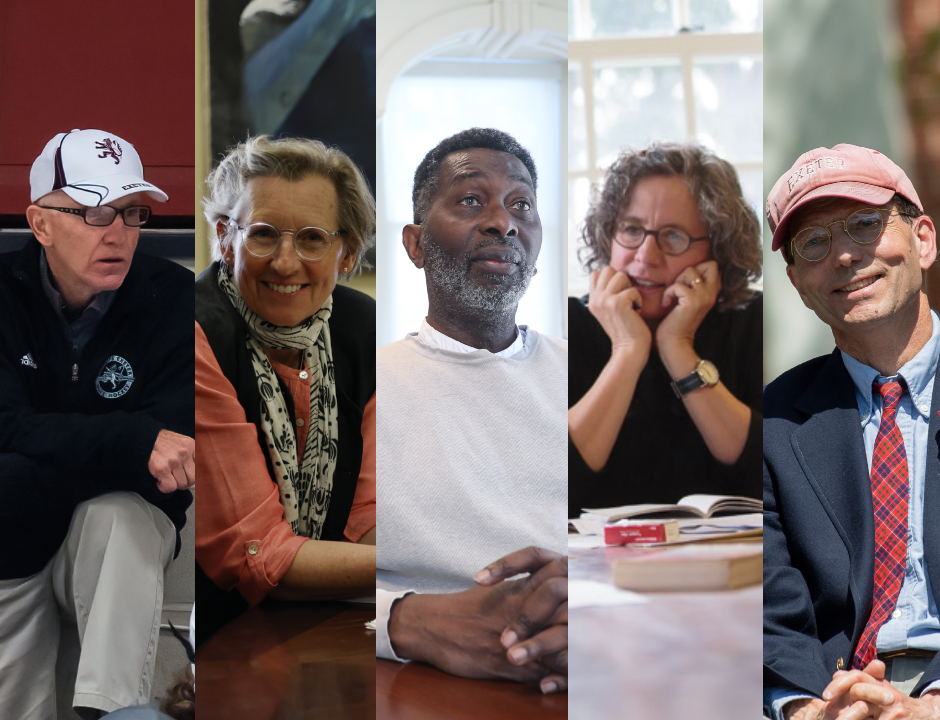
The Academy says farewell to five longtime faculty members.
Students and colleagues paid tribute to retiring instructors in the pages of The Exonian. Here we share the parting stories about those faculty members leaving with the distinction of emeriti.

Dana G. Barbin
Instructor in Physical Education
“I was asked to join the Physical Education Department and run the summer camps,” recalls Instructor in Physical Education Dana Barbin. “It was a two-year position. That was in 1987.”
Little did he know that was the beginning of a 37-year career at the Academy. “Lucky me,” he says. “This has been a great place to have a life, have a career and raise my family.”
Starting at the Academy as a director of Exeter’s hockey summer camp, Barbin also coached football, hockey and baseball from Day 1. After two years, he became athletic director of the Physical Education Department. He served in that position for nearly a decade, overseeing the department’s rapid growth from 1989 to 1999. Barbin was also a dorm head for a decade.
Over time, he absorbed Exeter’s non sibi spirit, describing it as the most important lesson he learned at the Academy. “When you have a life in education, your first concern is always the students,” he says.
“I had a colleague who told me, ‘Always keep in mind that every kid you are teaching and coaching is somebody’s daughter or son.’ That was a good education for me as a young faculty member. I’ve tried to go about my life here with that always in mind.”
Baron Masopust ’24 shares this sentiment about Barbin: “He taught me to treat everybody like family. He always treated me like family and has been more than a coach to me. He’s been a mentor, like a father figure here.”
Another of Barbin’s former players, Bradley Ingersoll ’17, says: “One of the quotes he used to always give us was, ‘See the world.’ It was a reference to keeping your head up on the ice, but I think it applies to life in general as well. Those words have stuck with me.”
Barbin has seen great change since he arrived at Exeter. “When I first came, the Academy was a really tough place for the kids,” he says. “We were kind of unyielding. If somebody had some struggles academically, they were gone. … Now, we give those students the help they need.”
To the mentees and players he cared for, Barbin was the one who created that change. “Coach Barbin, your retirement is truly the end of an era at the Academy, and a great one,” Eddie Caron ’01 says. “You have been the greatest coach, mentor and now friend to generations of Exonians. I reflect today with a warm heart on every Vet skate, our 1999 New England championship, and the countless lessons you taught me. Most of all, I am grateful to know we will never lose touch and that you will always be there for all of us, no matter where retirement takes you.”
— Sam Altman ’26, Jinmin Lee ’26, Hanna Wei ’27 and Forrest Zeng ’26
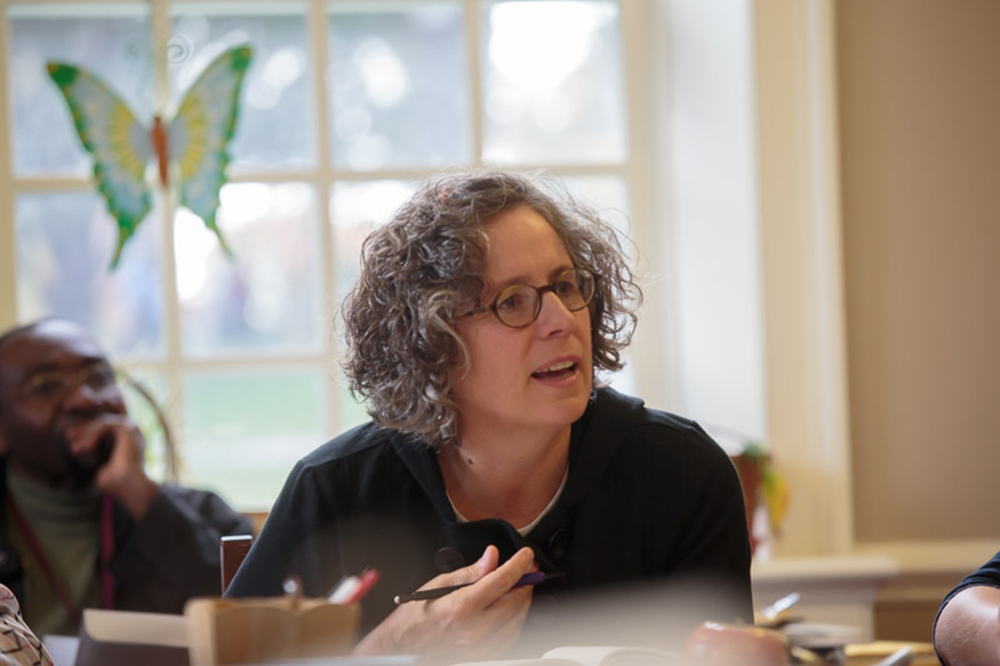
Michelle A. Dionne
Instructor in English
Appointed in 1996, Instructor in English Michelle Dionne spent 28 years teaching the craft of language and literature at the Academy. She also served as a coach for the girls tennis and hockey teams, a dorm faculty in Langdell Hall, the dorm head in Dow House, as well as the dorm head in Browning House (now Front Street dorm). In addition, Dionne spent time on the Community Conduct and Academic Advising Committees.
Dionne taught at a boarding school in Connecticut and at the Horace Mann School in New York for about 10 years before she found her true home and teaching environment at the Academy. “The Harkness pedagogy is what makes Exeter so unique,” she says. “The table is where we learn to listen. When you learn to listen to people around the table, what you think you understand, those preconceived notions, get blown away and then you feel a kind of joy in understanding something more deeply. … I think that’s something we are so fortunate to have at Exeter is that people are excited about learning. … There hasn’t been a day where I haven’t been touched by that enthusiasm.”
Dionne’s students agree on the effect of her ability to foster thought-provoking and comfortable Harkness discussions. “Ms. Dionne is always patient and supportive in the classroom,” Oscar Zhu ’27 says. “In discussions, she is willing to slow down the pace to make sure that everyone is caught up with the topics.”
Dionne introduced Thea Vaughan ’27 to Harkness at Exeter. “I think we all appreciated her so much and so we all bonded over that,” Vaughan says. “She was good at helping smooth entry into all Harkness classes, which I am so grateful for.”
Dionne’s support for her students has extended past the Harkness table as she taught them the essentials of composi
tion through personal narratives and essays. Sophie Morrow ’27 shares that “not only is Ms. Dionne very good at starting great Harkness discussions, but she is also extremely helpful when editing essays and papers.”
“Ms. Dionne is one of the greats,” Instructor in English Brooks Moriarty says. “She is like a Harkness Zen spiritual guide. She understands how to empower student voices, both in writing and at the table.”
Outside the classroom, Dionne uplifts the community with her infectious positivity and kind nature. “I’ve never seen her without a smile,” Anna Lane ’12 says. “She is a source of support to students, whether she teaches them or not.”
“One of my favorite things about her is how she maintains a total level head through all of her work,” Moriarty adds. “She’s so steady. She’s been a great mentor to a lot of people in the English Department, and we are going to miss her dearly, but she has left her mark because we have all learned so much from her.”
— Angela He ’27, Alex Lim ’27 and Jade Yoo ’27
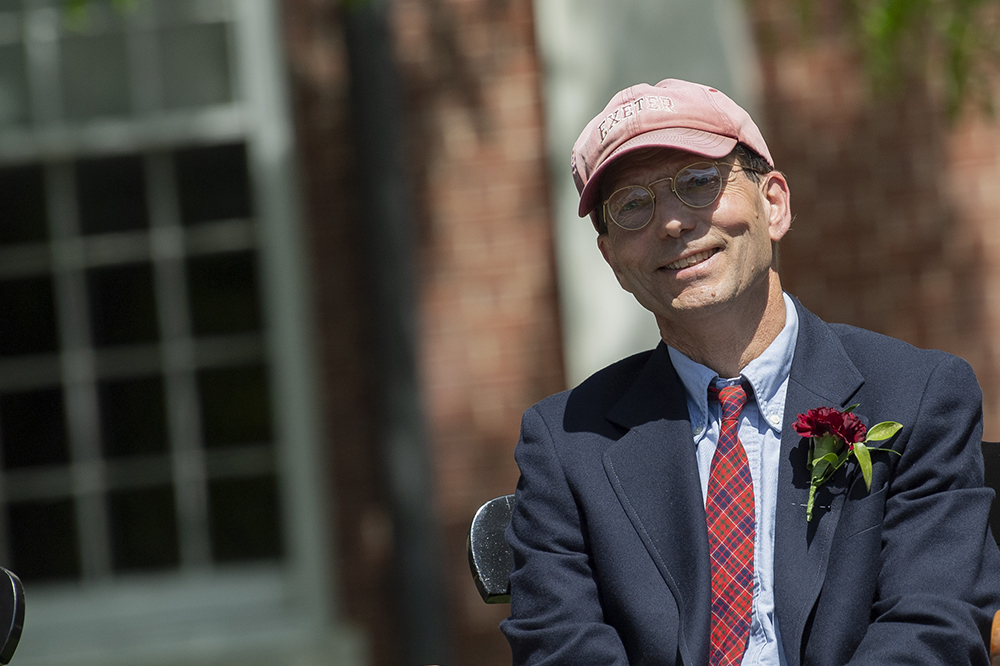
Mark R. Hiza
Instructor in Science
Mark Hiza, who has served as an instructor in physics and chemistry at the Academy since 1993, has retired, leaving a significant legacy of academic excellence that has deeply affected students and faculty. During his time here, he also coached boys JV hockey and track, served as Webster dorm head and was an adviser to many students.
As a teacher, Hiza has an unwavering dedication to pedagogy and support for every student. “Mr. Hiza is very bright,” Instructor in Science Chris Matlack notes. “He can challenge our best students, and the fact that he was teaching chemistry at the highest level makes his retirement a tremendous loss.”
Ben Soriano ’25 shares: “Mr. Hiza has impacted my PEA experience by being a teacher I can rely on to be objective and just in his teaching. His openness to simply greeting me along the paths and asking about my day has helped me feel welcome at the Academy.”
Tiffany Sun ’26 agrees, “Mr. Hiza has played an important role throughout my time at PEA. His rigorous teaching style made me a more disciplined student and helped me learn important skills for my next two years at Exeter.”
Matlack, a long-standing community member himself, has been working alongside Hiza since he arrived in 1993. Together, they coached the JV boys hockey team. “Hiza was also very instrumental in planning Phelps Science Center,” Matlack says. “He was very involved in designing the spaces and getting partners. He has also shown so much dedication to the school by coaching two sports, teaching, being well versed in two departments, and even being a dorm head.”
Caroline Matule ’19 says: “Physics was one of the courses I struggled with most during my time at Exeter. If it wasn’t for Mr. Hiza’s perpetual kindness and patience as I worked through the material, I’m not sure I would have survived the subject. But with his help, I was able to learn so much and even enjoy myself along the way.”
In turn, Hiza appreciates his students. “Many students here go far beyond the regular high school curriculum, especially in math and science,” he says. “I feel lucky to have worked at a school where, 15 years ago, some students asked me to help them learn thermodynamics. I really enjoyed developing and teaching that course. In the first few years of offering it, I was learning the subject with my students. My students would still teach me things about mathematics even when I finally gained a solid grasp of statistical thermodynamics in recent years. I am very grateful to them — they helped me to continue being a student, which I’ve always enjoyed.”
— Carly Canseco ’27, William Inoue ’27 and Sophie Zhu ’27
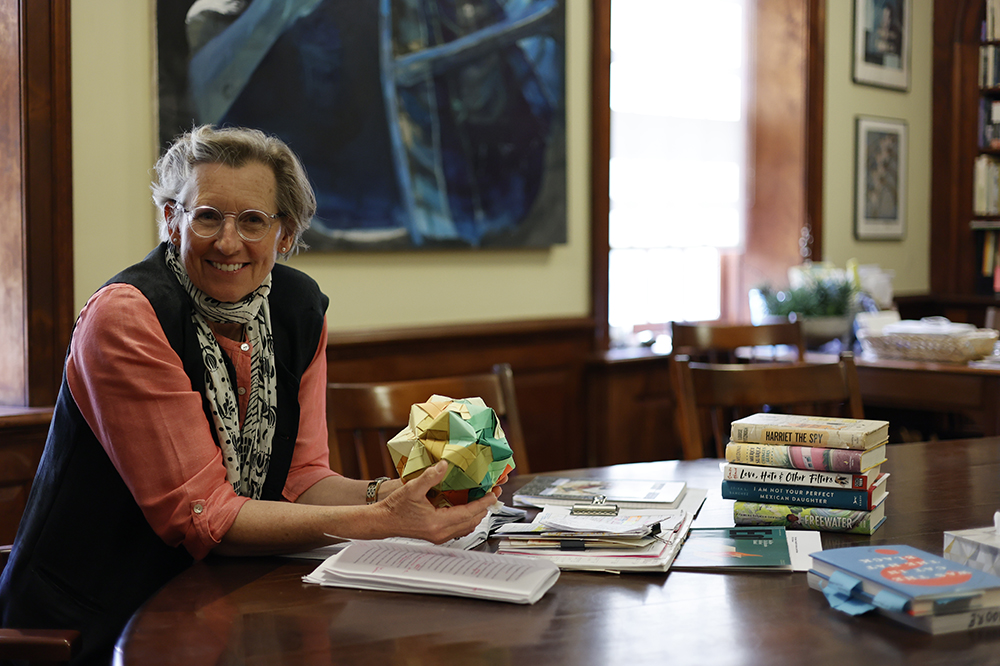
M. Rebecca ‘Becky’ Moore
Instructor in English
Her team gathers around, waiting to hear her wise advice before a race. Eight rowers and a coxswain, matching in red-and-black uniforms and white visors, listen to every word. They picture themselves flying down the 1,500-meter course, ahead of all the other boats. With the support of their coach, Ms. Moore, they know that they will have the attention, technique and strength to succeed.
Instructor in English Becky Moore has been a vital member of the Exeter community for 34 years. She has served as an instructor in English, crew coach, dorm head and department chair, and was a founding faculty member of the Exeter Humanities Institute.
Before coming to Exeter, Moore taught English, coached crew and lived in a dorm at Choate Rosemary Hall. After that, she attended graduate school, raised her family and worked part time at Exeter, teaching English and coaching JV crew, while commuting from Brooks School, where her husband worked. In 1994, Moore became a full-time faculty member and taught at the School Year Abroad program in France for a year. When she came back to Exeter, she moved with her family into McConnell Hall.
Moore says that one challenge she faced during her early years was the balance between family and work. “The school has a day care center, and that’s huge,” she says. “It was much smaller when we first got here, but it was one of the reasons I could stay. The balance has gotten better since I came.”
A friend, Instructor in English Jane Cadwell, shares: “Becky was instrumental in developing the Humanities Institute, which is now internationally known for teaching the Harkness pedagogy by having teachers become the students at the table rather than being idle teachers being told what to do. This is something unique in professional development. Becky has also been the standard-bearer for gender equality in our department — always reminding us to be vigilant when we choose books and invite speakers and writers to work with our students.”
Alex Myers ’96, Moore’s faculty mentee, expresses his appreciation, saying: “Becky brings passion and excitement, even to things she has done over and over again. She also has a strong set of values and advocates for those values, even when she knows they are unpopular … and at the same time she is open-minded. I think that’s a rare thing and extremely valuable.”
Former student Michelle Kwock ’95 says: “Ms. Moore is one of the most memorable teachers I’ve met at Exeter. Her writing assignments were always challenging and pushed me to have the discipline of writing more concisely with less meaningless fluff. My most difficult English assignment was to write a short descriptive piece with only single-syllable words, and it seems like her challenging assignments haven’t changed much over the years.”
Moore will be missed by many. “When I think of Becky at Exeter,” Cadwell reflects, “I see her out my classroom window riding down the hill to Phillips Hall on her green bicycle, skirt fluttering behind her. I will miss her steady presence, her respect for institutional memory, her loud laugh that travels the length of Phillips Hall, her resilience, and her willingness to stand up for her beliefs.”
— Sam Altman ’26, Allegra Lai ’26, Jinmin Lee ’26 and Lily Rampe ’26
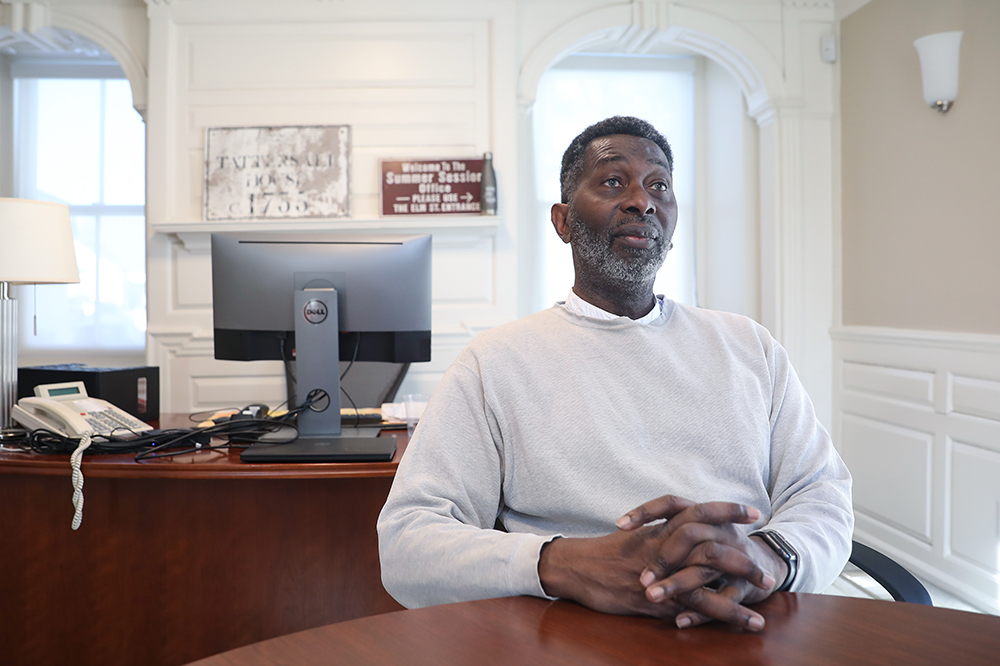
Russell Dwight Weatherspoon
Dean of Students, Instructor in Religion
After 37 years of incredible service and commitment, Dean of Students Russell Weatherspoon retired at the end of the school year. His wife, Jacquelyn “Jackie” Weatherspoon, retired alongside him, concluding a brilliant career in global activism and politics.
With their departure, the Weatherspoons have left an unforgettable mark on thousands of students and faculty. “Dean Weatherspoon and Mrs. Weatherspoon bring a wonderful combination of joy and wisdom to all they do,” Principal Bill Rawson ’71 says. “The perspectives they share based on their years of experience deepen every conversation. Their humor and goodwill lighten every interaction. Time spent with the Weatherspoons is time well spent.”
On campus, Weatherspoon stood out for his calm, relaxed demeanor, even in times of difficult decisions. “Working alongside him, I’ve learned patience and moderation,” Dean of Health and Wellness Johnny Griffith says. “I’ve learned how to take things slowly and deliberately, calmly and steadily.”
Weatherspoon was especially adept at forming close bonds with the student body, says Luca Shakoori ’24, one of his advisees. “From a leadership perspective, what makes him so effective is that he likes to spend time with students,” Shakoori says. “That feeling of camaraderie helps him lead effectively in more serious moments.”
Students and faculty alike adore Weatherspoon’s subtle humor and swagger. “He’s willing to have fun,” advisee Aidan Ting ’24 says. “During assembly, he’s seen as the ‘cool dean.’ He sings and doesn’t take himself super seriously. That’s a nice presence to have on campus.”
Francis Lee ’15 recalls, “Dean Weatherspoon was a rock in Soule Hall’s life while I was there — the ever-wise and ever-present force of humor and stability, yet still one who was graceful in the way he herded us back to the pack when we’d strayed too far.”
Reflecting on her time at the Academy, Elizabeth Closmore ’01 says: “Dean and Mrs. Weatherspoon were more than just fixtures of the campus; they were the heart of the Exeter community. As they move on to a well-deserved retirement, I am filled with gratitude. Their legacy of kindness, guidance and open doors profoundly shaped not just my Exeter experience, but that of countless other students. The Weatherspoons have been a quintessential part of the Exeter experience for decades — what a run! Thank you, Dean and Mrs. Weatherspoon, for everything. Here’s to a retirement filled with joy, health and precious family moments.”
— Erin Han ’26, Adelle Pitts ’27 and Forrest Zeng ’26
Editor’s note: This article was originally published in the Summer 2024 issue of The Exeter Bulletin.